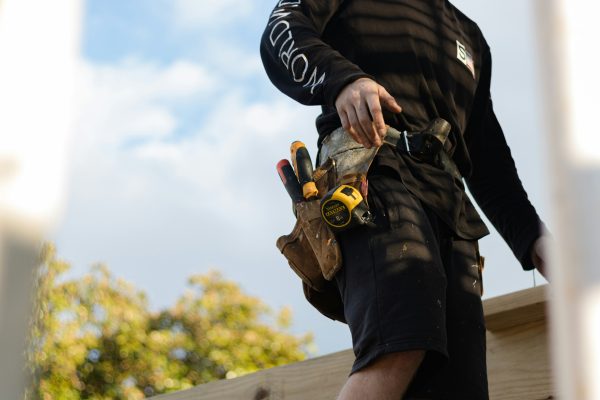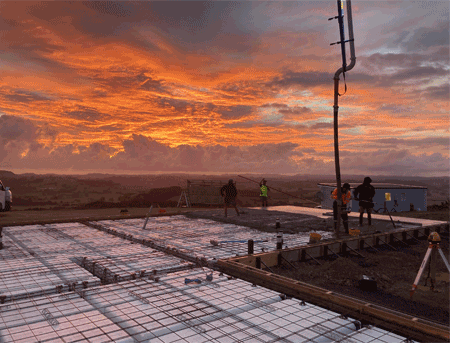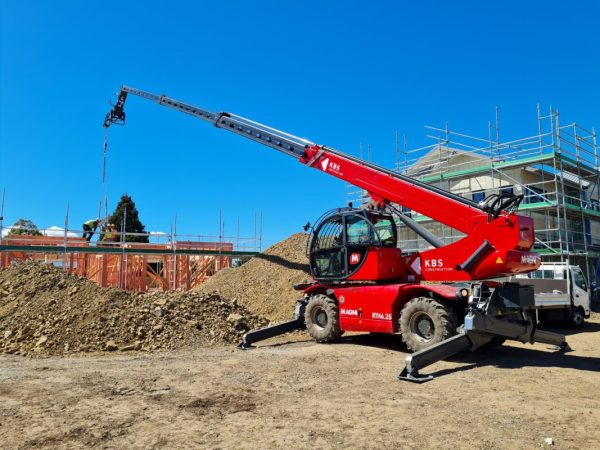The Importance of Choosing Licensed Building Practitioners
 New Zealand is a nation of builders and dreamers. From backyard renovations to brand new homes, building projects are a common part of the Kiwi experience. But navigating the complexities of construction can be daunting. One crucial decision that can make all the difference is choosing the right building partner. Cutting corners on qualified professionals can lead to a multitude of problems down the line, including safety hazards, delays, and even difficulties selling your property in the future. This is where Licensed Building Practitioners (LBPs) come in.
New Zealand is a nation of builders and dreamers. From backyard renovations to brand new homes, building projects are a common part of the Kiwi experience. But navigating the complexities of construction can be daunting. One crucial decision that can make all the difference is choosing the right building partner. Cutting corners on qualified professionals can lead to a multitude of problems down the line, including safety hazards, delays, and even difficulties selling your property in the future. This is where Licensed Building Practitioners (LBPs) come in.
Understanding Licensed Building Practitioners (LBPs)
Who are LBPs?
Licensed Building Practitioners (LBPs) are building professionals who have been assessed and proven competent to carry out specific types of building work that are crucial for the structural integrity and weathertightness of residential buildings in New Zealand. This ensures a higher standard of safety and quality in construction projects.
Types of LBP Work and Classes
There are seven LBP classes, each focusing on specific areas of expertise within the building industry. For example, some LBP classes include:
- Carpentry
- Roofing
- Plumbing
- Bricklaying
- Drainage
- Structural Design
Each LBP class has its own specific scope of work, ensuring that practitioners are qualified to handle the tasks they undertake.
The LBP Scheme and its Purpose
The LBP scheme was established by the New Zealand government to promote better building design and construction practices. It ensures that LBPs working on homes and buildings possess the necessary skills and knowledge to get the job done right the first time. This ultimately benefits homeowners and builders by promoting safety, quality, and fewer problems down the track.
Learn More About LBPs
To find out more details about LBP classes and the LBP scheme, you can visit the official LBP website: https://www.lbp.govt.nz/about-us/about-the-lbp-scheme/.
Benefits of Hiring Licensed Building Practitioners (LBPs)
There are numerous advantages to choosing a Licensed Building Practitioner (LBP) for your building project. Here’s how hiring an LBP can benefit you:
Assurance of Quality Workmanship
LBPs are qualified professionals who have undergone rigorous training and assessment to demonstrate their skills and experience. This ensures they have the expertise to deliver high-quality construction work that meets all required standards. By hiring an LBP, you minimise the risk of errors and shoddy workmanship, leading to a more durable and long-lasting building project.
Compliance with Building Codes
Building codes are constantly evolving to ensure the safety and integrity of buildings. LBPs are required to stay up-to-date on the latest regulations. This means they can ensure your project adheres to all legal requirements, avoiding costly delays and potential rebuilds due to non-compliance.
Access to Up-to-Date Knowledge and Best Practices
The construction industry is constantly adopting new technologies and best practices. LBPs are required to participate in ongoing professional development to maintain their licences. This ensures they bring the latest knowledge and most efficient building methods to your project, potentially saving you time and money in the long run.
Insurance Coverage and Potential Warranties
Most LBPs carry their own insurance policies, providing financial protection in case of unforeseen events during construction. Additionally, some LBPs may offer warranties on their completed work, giving you added peace of mind and protection against future issues.
Smoother Council Approval Processes
LBPs are familiar with the building consent process and can help ensure your application meets all necessary requirements. This can streamline the approval process and potentially save you time and frustration.
The Importance of LBPs for Certain Building Projects
The Building Act 2004 plays a crucial role in ensuring the safety and quality of buildings in New Zealand. This act outlines regulations for specific types of building work. While we won’t delve into the legal specifics, it’s important to understand the importance of Licensed Building Practitioners (LBPs) for these projects.
Why are LBPs Important for Certain Building Work?
There are several reasons why using an LBP for projects covered by the Building Act is advantageous:
- Peace of Mind: Knowing a qualified professional with the necessary skills and experience is overseeing your project can provide significant peace of mind.
- Reduced Risk of Errors: LBPs are trained and assessed to ensure they have the expertise to minimise the risk of errors during construction. This reduces the chances of problems arising later and protects the overall integrity of your building project.
- Increased Likelihood of Project Success: LBPs bring a wealth of knowledge and experience to the table. This expertise helps ensure your project adheres to building codes and is completed smoothly and successfully, potentially saving you time and money in the long run.
Unsure About LBP Requirements?
If you’re unsure whether your specific building project requires an LBP, it’s always best to consult with a building professional or your local council. They can provide clear guidance on the regulations and whether an LBP is necessary for your project.
Choosing the Right LBP for Your Project
Selecting the right LBP is a crucial step in ensuring a successful and stress-free building experience. Here are some tips to guide you in choosing the most suitable LBP for your project:
Verifying Credentials and Experience
- Check the LBP Register: The official LBP website allows you to search for LBPs by location and class of work. This helps you verify their credentials and ensure they hold the appropriate license for your project.
- Experience Matters: Consider the LBP’s experience level and their experience with projects similar to yours. Look for an LBP who has a proven track record of successful projects in your area and for the type of work you require.
Gathering References and Feedback
- Request References: Ask potential LBPs for references from past clients. Contact these references to get their firsthand experience working with the LBP.
- Online Reviews: While not always a definitive measure, check online review platforms to see what previous clients have said about the LBP’s work ethic, communication style, and overall project experience.
Conducting Interviews and Asking Questions
- Schedule Interviews: Once you’ve narrowed down your options, schedule interviews with potential LBPs. This allows you to assess their communication style, personality fit, and approach to project management.
- Prepare Questions: Come prepared with a list of questions for the LBPs. This might include questions about their experience with similar projects, their project approach, communication style, availability, and insurance coverage.
Here are some additional questions you may consider asking:
- Can you walk me through your typical project timeline and communication plan?
- How do you handle unexpected issues that arise during construction?
- Do you have references I can contact who have had similar projects done?
Remember: A good LBP should be happy to answer your questions openly and provide you with clear and concise information.
Comparing Quotes
Obtain Multiple Quotes: Get quotes from several different LBPs to compare pricing and understand the scope of work each LBP includes in their offer.
Beware of Extremely Low Quotes: While cost is a factor, be wary of quotes that seem significantly lower than others. This could be a sign that the LBP may be cutting corners or using unlicensed subcontractors.
By following these tips and conducting thorough research, you can increase your chances of finding the right LBP who will deliver a successful and high-quality building project.
The Role of LBPs in the Building Process
Licensed Building Practitioners (LBPs) play a vital role throughout the various stages of your building project. Their expertise ensures your project adheres to building codes, is completed with quality workmanship, and progresses smoothly. Here’s a closer look at the key responsibilities of LBPs during the building process:
Planning and Design Review
- Reviewing Building Plans: LBPs can review your building plans to ensure they comply with all relevant building codes and regulations. This helps identify potential issues early on in the process, saving time and money in the long run.
- Offering Design Expertise: Some LBPs may also have experience and expertise in building design. They can provide valuable input on design elements and ensure they are structurally sound and meet all building code requirements.
Material Selection and Building Code Compliance
- Material Selection: LBPs have a thorough understanding of building materials and their suitability for different applications. They can advise you on selecting the appropriate materials that meet building code requirements and are best suited for your project.
- Building Code Compliance: LBPs ensure that all aspects of construction adhere to the relevant building codes. This includes aspects like structural integrity, weatherproofing, fire safety, and accessibility.
Quality Control Throughout Construction
- Regular Inspections: LBPs will conduct regular inspections throughout the construction process to ensure the work is being carried out according to the plans and specifications. This helps identify and address any potential issues early on before they become larger problems.
- Maintaining Quality Standards: LBPs are committed to upholding high standards of workmanship. They will oversee the construction process to ensure the work meets all quality requirements.
Sign-off on Completed Work for Council Approval
- Final Inspections: Once construction is complete, the LBP will conduct a final inspection to ensure everything meets the building code and project specifications.
- Council Sign-off: The LBP will prepare and sign-off on the necessary paperwork for council approval. This allows the council to verify that the building complies with all regulations and issue the necessary occupancy certificate.
By working with an LBP throughout the building process, you can be confident that your project is in the hands of a qualified professional who is committed to quality, safety, and successful completion.
Avoiding Unlicensed Practitioners
While it may seem tempting to cut costs by hiring an unlicensed practitioner, the risks associated with this approach far outweigh any potential savings. Here’s why it’s crucial to choose a Licensed Building Practitioner (LBP) for your building project:
Legal and Financial Repercussions
- Fines and Legal Issues: Using an unlicensed practitioner for restricted building work can lead to fines and legal repercussions for both the homeowner and the builder.
- Project Delays: If unlicensed work is discovered during council inspections, the project may be halted until the issues are rectified by a qualified LBP. This can lead to significant delays and additional costs.
Safety Hazards During Construction
- Compromised Structural Integrity: Unlicensed practitioners may not have the necessary knowledge or expertise to ensure proper building techniques are followed. This can compromise the structural integrity of your building and pose serious safety hazards.
- Increased Risk of Accidents: Unlicensed builders may not be familiar with proper safety protocols, increasing the risk of accidents and injuries on the construction site.
Problems During Future Property Sales
- Non-compliant Work: If your building work is not completed by an LBP and does not comply with building codes, you may face difficulties selling your property in the future. Buyers may be unwilling to take on the risk of non-compliant work, or you may be forced to rectify the issues at your own expense before selling.
- Reduced Sale Value: Non-compliant building work can significantly reduce the market value of your property.
By choosing a qualified LBP, you can avoid these potential pitfalls and ensure your building project is completed safely, legally, and to a high standard. This will not only give you peace of mind during construction but also protect your investment in the long run.
Conclusion
Building a new home or renovating your existing one is an exciting yet complex process. Choosing the right building partner is crucial for ensuring a successful, stress-free, and ultimately enjoyable experience.
This is where Licensed Building Practitioners (LBPs) come in. LBPs are qualified professionals who possess the necessary skills, knowledge, and experience to deliver high-quality building projects that comply with building codes and regulations.
By hiring an LBP, you gain significant advantages like peace of mind, reduced risk of errors, access to up-to-date building practices, and a smoother journey through the building process.
This article is brought to you by Coastal Construction who are committed to delivering exceptional building projects for their clients. Their team of experienced professionals can guide you through every step of the process, ensuring your dream becomes a reality.
Contact Coastal Construction today for a free consultation and discuss how we can help you achieve your building goals with confidence and peace of mind.
For additional resources on choosing the right building professional and building best practices, visit the Building Performance website







